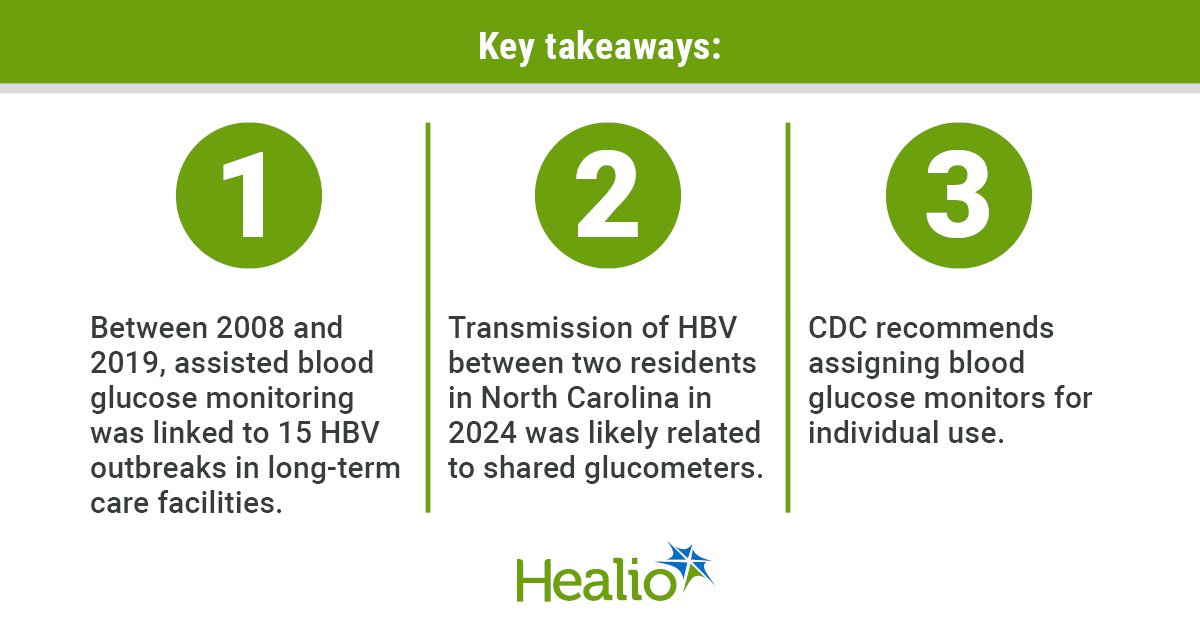August 25, 2025
2 min read
Key takeaways:
- HBV transmission in a skilled nursing facility appeared linked to a shared glucometer.
- Providing routine HBV vaccination to residents with diabetes and assigning glucometers for individual use could reduce risk.
Transmission of hepatitis B virus between two residents in a skilled nursing facility in North Carolina was traced to shared glucometers, according to an investigation published in Morbidity & Mortality Weekly Report.
Between 2008 and 2019, 15 HBV outbreaks linked to assisted monitoring of blood glucose occurred in long-term care facilities in the United States.

Data were derived fromMoore JR, et al. MMWR Morb Mortal Wkly Rep.2025; doi:10.15585/mmwr.mm7429a2.

Joshua Moore
“Sharing blood glucose monitors presents a risk for HBV transmission in nursing homes that can be reduced by nursing homes dedicating glucometers to a single resident, and clinicians offering HBV vaccination to adults 60 and older with risk factors for infection, including receiving blood glucose monitoring,” Joshua Moore, MPH, viral hepatitis epidemiologist in the communicable disease branch of North Carolina Department of Health and Human Services’ division of public health (NCDPH), told Healio. “CDC recommends assigning glucometers to one person.”
The NCDPH was alerted by Surry County Health Department in May 2024 about a 69-year-old hospitalized patient with diabetes who was diagnosed with acute HBV infection after transfer from a skilled nursing facility.
The patient, who was hospitalized for an unrelated condition, had no history of HBV infection or vaccination but underwent viral hepatitis testing upon admission due symptoms indicative of acute hepatitis. The diagnosis was confirmed by a positive hepatitis B surface antigen and IgM anti-HBc results, HBV DNA result, as well as positive HBV DNA result.
“Based on CDC guidance, NCDHHS-DPH considers persons without known risk factors for HBV infection and with evidence of recent transmission that is suspected to be health care-associated — including long-term residence in a health care setting such as a nursing home — to be high priority cases requiring further investigation,” Moore said.
State and county health department investigators observed during an infection control assessment that glucometers at the skilled nursing facility were shared among several residents and were disinfected between uses, according to manufacturer instructions. No other discrepancies in infection control protocols were observed.
In mid-June, all residents of the facility were tested for HBV infection, which revealed one resident with a previously diagnosed but unreported chronic HBV infection. This resident had lived in a room near that of the resident diagnosed with acute HBV infection.
Documentation of assisted blood glucose monitoring from March to April 2024 showed that during this time, the individual with chronic HBV infection and the resident with acute HBV infection underwent daily testing from one of two devices. It was further discovered that the newly infected resident repeatedly received testing less than a minute after the patient with chronic HBV infection — a potentially insufficient interval for proper disinfection.
HBV strains affecting the two patients were genetically identical, according to whole genome sequencing.
NCDPH notified all previously discharged residents whose time at the facility corresponded with that of the resident with chronic HBV advised bloodborne pathogen testing. No additional cases had been identified as of March 2025.
“Current guidance from the Advisory Committee on Immunization Practices recommends universal HBV vaccination for persons aged younger than 60 years,” Moore told Healio. “Based on shared clinical decision-making, ACIP also recommends HBV vaccination for adults aged 60 years and older at higher risk for HBV infection, such as those with diabetes.”
He added, “Clinicians considering providing HBV vaccination to adults aged 60 years and older with diabetes should consider the risk posed by assisted blood glucose monitoring in nursing homes.”
For more information:
Joshua Moore, MPH, can be reached at joshua.r.moore@dhhs.nc.gov.










